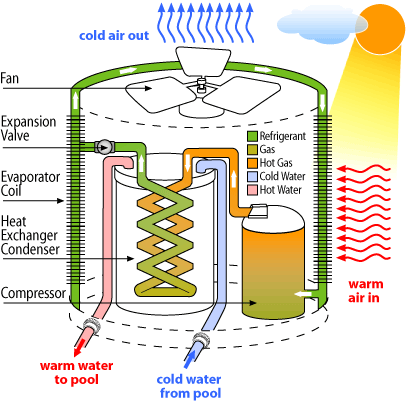How Heat Pump Pool Heaters Work
A Heat Pump uses electricity to operate but they also use the sun-warmed air which contributes to the efficiency of the unit. Heat Pump Pool Heaters do not generate heat.
Your existing pool pump circulates the water through the heater and warms the pool. The FAN circulates air through the outer EVAPORATOR AIR COIL that acts as a heat collector. The liquid refrigerant in the air coil absorbs the available heat in the ambient air transforming it into a gas. The refrigerant gas is then pumped into the COMPRESSOR. When this warmed gas is compressed, it intensifies or concentrates the heat like a magnifying glass in the sun. This intensely hot gas is then pumped into the HEAT EXCHANGER CONDENSER where the actual heat transfer takes place. As the pool water passes through the heat exchanger, the hot gas gives up its heat to the cooler pool water. The refrigerant returns to a liquid state and is pumped through the EXPANSION VALVE then into the evaporator air coil to start the process all over again.

Higher efficiency heat pump pool heaters usually use scroll compressors versus the reciprocal compressors of standard units.
Heat pump pool heaters work efficiently as long as the outside temperature remains above the 45ºF–50ºF range. The cooler the outside air they draw in, the more energy they use. However, since most people use outdoor swimming pools during warm and mild weather, this usually isn't an issue.
Heat pump pool heaters cost more than gas pool heaters, but they typically have much lower annual operating costs because of their higher efficiencies. With proper maintenance, heat pump pool heaters typically last longer than gas pool heaters. Therefore, you'll save more money in the long run.
With proper installation and maintenance, heat pump pool heaters can last 10 or more years.
Other forms of pool water heating are Solar and Gas. View this side-by-side pool heating comparison chart to determine which technolgoy is best for you.
|